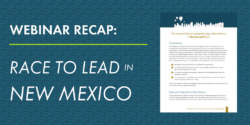Oct
1
2020
The Building Movement Project (BMP) recently hosted a webinar on the newly released publication, The Nonprofit Racial Leadership Gap in New Mexico: A Race to Lead Brief. The findings of the report were presented by BMP’s Senior Research Associate, Ofronama Biu, and the panel discussion was moderated by BMP’s longtime consultant in New Mexico, Alicia Lueras Maldonado. The panel featured local nonprofit leaders Laura Harris (Executive Director, Americans for Indian Opportunity) and James Jimenez (Executive Director, New Mexico Voices for Children), who responded to the report findings and shared their perspectives and experiences as leaders of color in New Mexico.
Quick Access: Report, Recording, Transcript, Presentation Slides
The conversation with the panelists was grounding, insightful, and full of recommendations and opportunities for change in New Mexico and the nonprofit sector at large. Some of the key takeaways are noted below.
Leaders of color need funding
Both Laura and James identified the power and potential of having people of color in leadership positions. James noted that the data around leadership aspirations by people of color is uplifting, but that it is disheartening to see that many leaders of color do not feel welcome in their roles. He suggested that philanthropy can support leaders of color by being less prescriptive. From a financial perspective, he reminded us that “building strong organizations, developing strong staff, and building relationships all require significant, multi-year, general support funding.”
Laura echoed these needs and added that New Mexico is a unique place, so foundations must be understanding, responsive, and flexible when it comes to investing in nonprofits in New Mexico. “They need to trust us more,” confirmed James. Trust was a common theme throughout the panel discussion. Both panelists identified that while building trust can be difficult when confronting racial bias and inequity, it remains absolutely essential to achieving social and systems change. Laura reminded us that “trusting relationships allow people to be creative and innovative. [Funders need to] make spaces more comfortable and inclusive by intentionally, purposefully inviting diverse groups of people into them.”
Anti-racism and building trust
Laura expanded on the unique nonprofit landscape in New Mexico and emphasized that funders should connect with their grantees and learn their history. There are strategies and practices that need to be put in to place in order to build relationships, trust, and community. In regard to anti-racism work, James identified two important pieces: intellectual understanding and an open heart. He lifted up the need for data that reflects the lived experiences of people of color, and also the need for folks to bring an open heart into difficult conversations about race and inequality. James called for a recognition of and commitment to ending anti-Black racism in the United States. “Our society is steeped in racist history. It’s going to take a lot of work to undo it. We need to listen to the experiences of our colleagues, bring an open heart, and build that trust,” James concluded.
Looking ahead in New Mexico
Things have shifted drastically in the past few months for nonprofits in New Mexico and across the country. Laura urged us to think radically, to use this moment as an opportunity to create new things. “Systems are failing,” she pointed out. “Why do we want to prop up these old systems that don’t work?” She identified the shifts that are happening across the country, on local and national scales, that demonstrate the capacity of organizations to change and pivot in response to the needs of their communities. “We can change our values. We can find ones that fit us better,” she offered.
Both panelists agreed that we’re in a pivotal moment and that transformational change won’t be easy as we move forward, but it is necessary to securing equity and justice. Laura identified the very real and immediate needs of folks directly impacted by inequity – like food security, housing, and healthcare – and how difficult it is to engage community members when in crisis mode. Returning to transformational change, James noted that in order to advance social change, institutions that hold power and money must be prepared to change as well.
To explore more of the data and analyses, you can download the full report. You can also watch the webinar recording below (or on YouTube), read the webinar transcript, and download the presentation slides.

